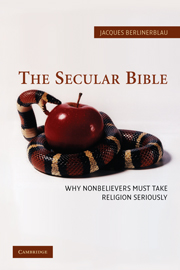Book contents
- Frontmatter
- Contents
- Preface and Acknowledgments
- Introduction: Secularists and the Not Godless World
- PART ONE THE COMPOSITION OF THE HEBREW BIBLE
- PART TWO THE INTERPRETERS OF THE HEBREW BIBLE
- PART THREE POLITICS AND SCRIPTURE
- Conclusion: Beyond Church and State: New Directions for Secularism
- Notes
- Index of Biblical Citations
- Index of Qur'ānic Citations
- Index of Rabbinic, Early Jewish, and Patristic Citations
- Index
Introduction: Secularists and the Not Godless World
Published online by Cambridge University Press: 05 June 2012
- Frontmatter
- Contents
- Preface and Acknowledgments
- Introduction: Secularists and the Not Godless World
- PART ONE THE COMPOSITION OF THE HEBREW BIBLE
- PART TWO THE INTERPRETERS OF THE HEBREW BIBLE
- PART THREE POLITICS AND SCRIPTURE
- Conclusion: Beyond Church and State: New Directions for Secularism
- Notes
- Index of Biblical Citations
- Index of Qur'ānic Citations
- Index of Rabbinic, Early Jewish, and Patristic Citations
- Index
Summary
Question: What is the opposite of faith?
Not disbelief. Too final, certain, closed. Itself a kind of belief.
Doubt.
Salman Rushdie, The Satanic VersesNONBELIEVERS, THE BIBLE, AND RELIGION
In all but exceptional cases, today's secularists are biblically illiterate. Truth be told, their repertoire of knowledge about religion in general leaves much to be desired. It might consist of prurient jokes about the clergy, the citation (or miscitation) of a few noxious verses from Scripture, and maybe a Bertrand Russell quote thrown in for good measure. Secularists are free, of course, to disregard issues pertaining to religious belief. They do not need to pay attention to the actual words of the Hebrew Bible/Old Testament or to those of the New Testament and the Qur'ān. Nor do they need to think about the countless ways in which such words have been interpreted. These interpretations, incidentally, inspire those manifestations of piety that so puzzle nonbelievers: the fasting and the frenzy; the pilgrims on bloodied knees; the athletic feats of sexual repression; the acts of utterly selfless grace, and the wearing of turbans, Yarmulkes, veils, and other forms of sacred headgear, to name but a few. Secularists are free to remain oblivious to all this.
But perhaps now is not the best time to exercise this freedom. Contrary to what so many nineteenth- and twentieth-century social theorists believed (and hoped for), the species has not abandoned its faith in the divine. Karl Marx's optimism about the impending abolishment of religion was unfounded.
- Type
- Chapter
- Information
- The Secular BibleWhy Nonbelievers Must Take Religion Seriously, pp. 1 - 14Publisher: Cambridge University PressPrint publication year: 2005



